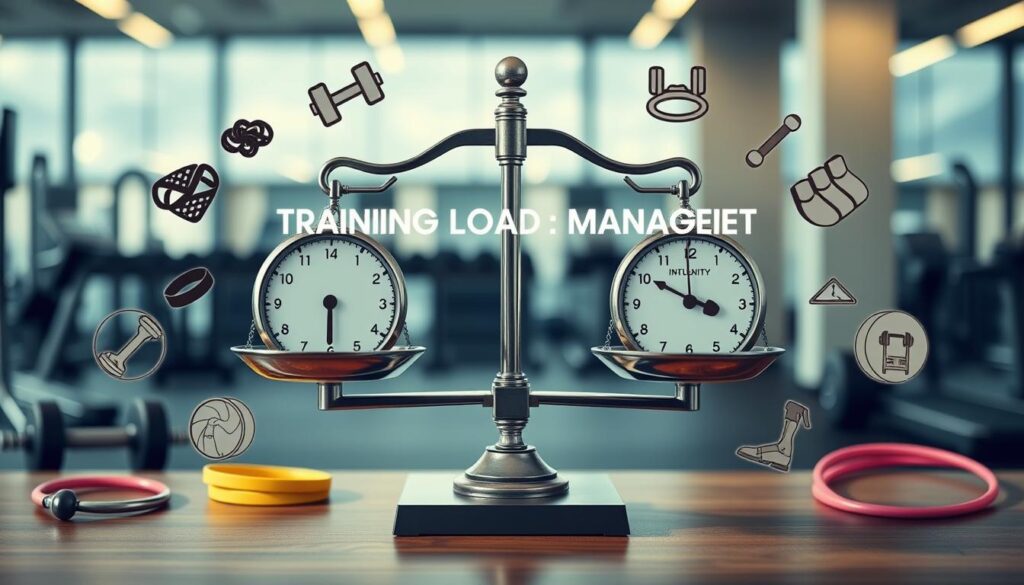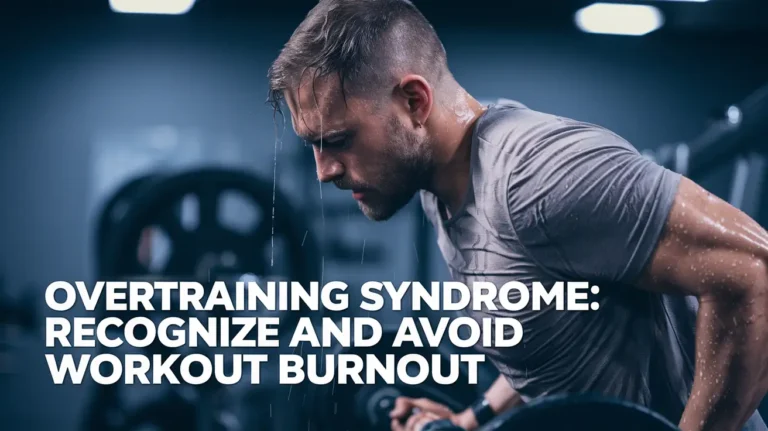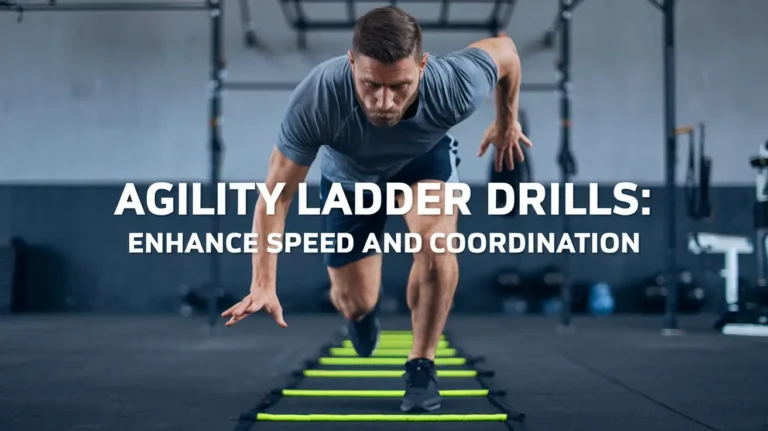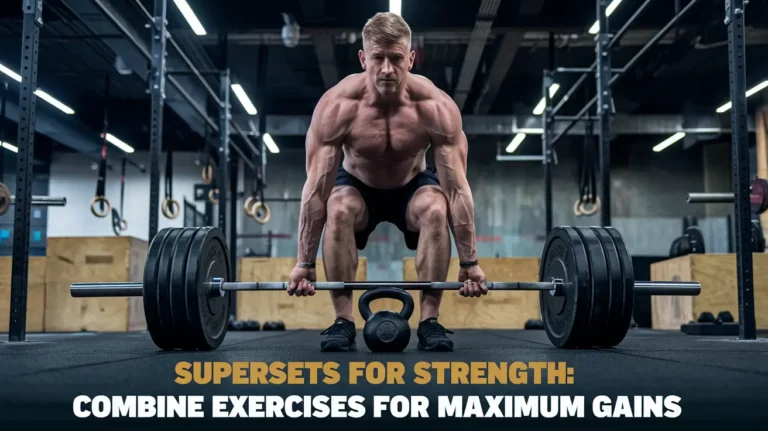As fitness lovers, we often push hard to reach our goals. But what if this drive leads to burnout and fatigue? Welcome to Overtraining Syndrome, where our drive can become a major obstacle.
I’ve been there myself. I was once an athlete, eager to excel, but ended up exhausted and injured. It was a tough lesson, teaching me about the balance between body, mind, and exercise.
In this article, we’ll explore Overtraining Syndrome. We’ll look at its causes, symptoms, and how it affects us. We’ll also share ways to prevent it and get back to our fitness journey with energy and strength.
Key Takeaways about Overtraining Syndrome
- Overtraining Syndrome happens when exercise stress is too much for our bodies. It leads to poor performance, injuries, and health problems.
- Symptoms include not being able to train as before, feeling very tired, and slow recovery from workouts.
- It can also cause long-term fatigue, tension, depression, and poor sleep.
- Checking resting heart rate and heart rate variability can show if you’re overtraining. They show how your body handles stress.
- To avoid overtraining, try periodization, cross-training, active recovery, and focus on sleep and nutrition for better recovery.
Understanding Overtraining Syndrome
Overtraining Syndrome is a serious condition caused by too much physical training without enough rest. It affects many fitness lovers and athletes who don’t give their bodies enough time to recover. Knowing what it is, its symptoms, and causes is key to staying healthy and avoiding its negative effects.
Definition and Symptoms
Overtraining Syndrome shows up as constant tiredness, lower performance, and a higher resting heart rate. It’s different from regular tiredness because it lasts longer and affects your health and fitness more. Unlike overreaching, which can be fixed with rest, overtraining needs more time to recover fully.
Causes of Overtraining
The main reason for Overtraining Syndrome is pushing too hard without enough rest. This can happen when you do too much, too intense, or too often. Lack of sleep, bad nutrition, and too much stress can also play a part in getting this condition.
How It Differs from Regular Fatigue
Regular tiredness after working out is normal and temporary. But Overtraining Syndrome is a lasting exhaustion that hurts your performance and health. Unlike regular tiredness, which goes away with rest, overtraining needs a deeper recovery plan.
“Deload weeks, taken every six to eight weeks, can be key to improving fitness gains among gym enthusiasts. Resting or doing low-intensity exercise during deload weeks is essential for the body to recover from accumulated muscle damage.”
The Science Behind Overtraining
Athletes often push too hard in their quest for the best performance. This can lead to overtraining, which affects both body and mind. It’s key for athletes and coaches to know the signs and how to recover.
Physiological Effects on the Body
Overtraining messes with hormones, lowering testosterone and raising cortisol. This can slow down muscle repair, weaken the immune system, and cause adrenal fatigue. It also messes with the nervous system, making the heart rate go up and making it harder for the heart to adjust.
Research in Sports Medicine and the Journal of Applied Physiology shows these effects. It’s vital to catch overtraining early to avoid serious harm.
Psychological Impact on Mental Health
Overtraining also hurts the mind. Athletes might feel more tense, depressed, angry, and confused. The recovery deficit and hormonal imbalances affect their mental health. This can make the physical symptoms worse, creating a cycle that’s hard to stop.
It’s important to tackle the mental side of overtraining to fully recover. By grasping the science, athletes and coaches can prevent and fix the damage caused by overtraining.
“Overtraining can have a significant impact on both the body and the mind, disrupting the delicate balance that fuels peak athletic performance. By understanding the underlying science, we can empower athletes to recognize the warning signs and take the necessary steps to recover, ultimately achieving sustainable success.”
Signs You’re Overtraining
Finding the right balance in physical fitness is key. Overtraining can upset this balance, causing problems. Knowing the signs of overtraining helps prevent burnout and injury.
Physical Indicators to Watch For
Muscle soreness that lasts, lower performance, and a higher resting heart rate are signs. Also, getting sick more often can mean your immune system is weakened from overuse injuries and overstressed muscles.
Emotional and Mental Warning Signs
Overtraining affects your mind and feelings too. Mood swings, lack of motivation, trouble focusing, and sleep issues are signs. Feeling tired, confused, and not enjoying exercise are also warnings.
Spotting these physical, emotional, and mental warning signs is vital. It helps prevent chronic fatigue and keeps your fitness journey going. By listening to your body and adjusting your training, you can avoid overtraining and stay at your best.
“Listening to your body and recognizing the signs of overtraining is essential for any athlete or fitness enthusiast. Taking the necessary steps to recover can make all the difference in avoiding burnout and injury.”
Recovery Strategies for Overtraining
Overcoming overtraining syndrome needs a full plan. This includes rest, recovery, and good nutrition. It’s key to cut down or stop hard workouts. The body must heal and get its energy back.
Importance of Rest and Recovery
Doing gentle activities like walking, yoga, or massage helps. These activities don’t stress the body too much. It’s important to let muscles and nerves rest. Overtraining can cause muscle strain, injuries, and a big drop in performance.
Nutrition Tips for Healing
Good nutrition is crucial for recovering from overtraining. Make sure to eat enough protein for muscle repair and energy. Also, eat a variety of foods to fight inflammation and fix gut problems. Don’t cut calories too much, as the body needs lots of nutrients to heal.
Using these recovery techniques, nutritional support, and active rest methods can help. They tackle the many challenges of overtraining. This way, you can get back to your best physical and mental health.
“Recovery is not just about rest and nutrition – it’s about rebuilding the body, mind, and spirit.”
Advanced Fitness Techniques to Avoid Overtraining
Adding advanced fitness techniques to your workout can help you avoid overtraining. Using training periodization, cross-training, and active recovery can balance challenge and rest. This balance is key to keeping your body healthy and strong.
Periodization in Training Programs
Periodization means changing the intensity and volume of your workouts over time. It helps your body adapt and recover, leading to better performance and less injury risk. This method keeps your training effective and safe.
Incorporating Cross-Training
Cross-training involves doing different physical activities. It targets various muscle groups and improves your heart health. This approach reduces injury risk and boosts overall fitness.
Utilizing Active Recovery Methods
Active recovery includes low-intensity exercises, stretching, or swimming. These activities help with blood flow, muscle soreness, and tissue repair. They support your body’s recovery and help you stay fit.
Using these advanced techniques can make your training better and safer. They help you reach your fitness goals without overdoing it. Remember, a balanced and strategic approach is key to a healthy workout routine.
Balancing Intensity and Volume
Finding the right mix of workout intensity and volume is key to avoiding overtraining. It helps you get the best results. Knowing how training loads work is essential for a good workout plan.
Comprehending Training Loads
Training load looks at how hard and long your workouts are. The intensity is how tough the exercise is, and volume is how much work you do. A good plan mixes hard and easy workouts, with enough rest and getting stronger over time.
Strategies for Effective Program Design
- Use heart rate monitors, perceived exertion scales, and performance metrics to guide your training decisions and ensure you’re not overreaching.
- Incorporate a variety of training modalities, such as strength training, interval workouts, and easy-paced cardio, to target different energy systems and muscle groups.
- Gradually increase your training volume and intensity over time, avoiding sudden spikes that can lead to injury or burnout.
- Prioritize recovery by allowing for sufficient rest days and implementing active recovery techniques like foam rolling and light cardio.
By understanding and applying these strategies, you can unlock the benefits of training load management and avoid the pitfalls of overtraining. Stay tuned for more insights on optimizing your fitness journey.

The Role of Sleep in Preventing Overtraining
As athletes, we understand how vital quality sleep is for recovery and avoiding overtraining. Sleep helps balance our hormones, repairs muscles, and boosts brain function. Not getting enough sleep can harm our athletic performance, increase injury risk, and affect our mental health.
Sleep’s Impact on Recovery
Studies reveal that not enough sleep can slow down recovery for athletes. Athletes who sleep less than eight hours a night are almost twice as likely to get hurt. Poor sleep also leads to mood swings, anxiety, and depression, making it hard to perform well.
Tips for Improving Sleep Quality
- Stick to a regular sleep schedule, even on weekends, to keep your body’s rhythm.
- Make your bedroom cool, dark, and quiet to sleep better.
- Reduce screen time and blue light before bed to keep your sleep cycle natural.
- Try relaxation techniques like meditation or deep breathing to relax before sleep.
- Stay away from caffeine and alcohol close to bedtime to improve sleep.
Research suggests athletes might need more sleep than others to recover fully. They should aim for at least nine hours of sleep each night. By focusing on good sleep habits and solving sleep problems, we can avoid overtraining and improve our sports performance.
“Lack of sleep can lead to decreased reaction time, sprint performance, and serve accuracy in athletes. Prioritizing sleep is crucial for recovery and preventing overtraining.”
Monitoring Your Progress Effectively
Tracking your fitness and performance is key to avoiding overtraining. By using different tools and methods, we can understand our training better. This helps us make changes to keep our training healthy.
Tools and Techniques for Tracking Performance
Fitness trackers can monitor heart rate and more. Keeping detailed training logs is also helpful. Checking these regularly helps us spot when we’re tired or not improving, guiding our training.
- Use fitness trackers to watch heart rate and other important signs
- Keep detailed logs of workouts, sleep, and rest
- Check your performance in speed, power, and endurance regularly
Knowing When to Adjust Your Training
It’s important to know when to change your workout plan. Listening to your body and adjusting your training can prevent burnout. This keeps your training healthy and sustainable.
- Watch for physical signs like more muscle soreness, less energy, or changes in heart rate
- Notice how you feel emotionally and mentally, as mood swings or feeling unmotivated can mean overtraining
- Keep an eye on your performance and be ready to adjust your training if needed
Regularly checking in with yourself and listening to your body is crucial. The right tools help us track our performance tracking, fitness monitoring, and make the right training adjustments. This way, we can keep our fitness and well-being in top shape.

Seeking Professional Guidance
Getting help from professionals is key when dealing with overtraining. Whether you’re an experienced athlete or just starting out, a qualified trainer or sports psychologist can be a big help. They offer the knowledge and support you need to improve your training and recovery.
When to Consult a Trainer
If you’re always tired, not performing well, or getting hurt a lot, it’s time to get help. A professional trainer can watch your training closely, find any problems, and create a plan to avoid overtraining. With their expert advice, you can learn to balance your workouts, adjust how much you do, and recover better. This way, you can keep improving without hurting your health.
The Benefits of Working with a Sports Psychologist
The mental and emotional side of overtraining is just as important as the physical. A sports psychologist can help with this. They can teach you how to manage stress, stay motivated, and avoid burnout. Working with a sports psychology expert can give you strategies to keep your mind healthy, be more resilient, and achieve long-term success in sports.
“Seeking professional guidance is crucial in managing and preventing overtraining. Trainers and sports psychologists can provide the expert guidance needed to optimize your training and recovery routines, ensuring sustainable progress and overall well-being.”
By getting help from these experts, you can overcome the challenges of overtraining and reach your full potential. Whether you want to get better physically or mentally, using the professional training advice and sports psychology resources available can make a huge difference in your fitness journey.
Case Studies: Overcoming Overtraining Syndrome
Real-life examples of athletes who have beaten overtraining syndrome are truly inspiring. These stories show us the strength and will needed to get through tough times. They remind us that recovery is possible.
Real-Life Examples of Recovery
Marathoner Emily Wilson is a great example. She hit a wall due to overtraining, leading to burnout and poor results. But she took a break and followed a recovery plan. This included less training and focusing on her mental health.
Thanks to these steps, she bounced back and even set a new marathon record.
Lessons Learned from Overtraining Experiences
Professional cyclist Alex Ramirez also faced a tough road to recovery. He learned to listen to his body and adjust his training. This helped him avoid pushing too hard and losing the joy of cycling.
These stories teach us the importance of a well-rounded approach to avoid overtraining. Recognizing early signs, using effective recovery methods, and building mental strength are key. They help athletes of all levels stay on track and succeed in their sports.
Frequently Asked Questions
What is Overtraining Syndrome?
Overtraining Syndrome happens when exercise stress is too much for our bodies. It leads to poor performance, injuries, and health problems. It's different from regular tiredness because it lasts longer and affects your health and fitness more, unlike overreaching which can be fixed with simple rest.
What are the signs that indicate you might be overtraining?
Signs include constant tiredness, lower performance than before, a higher resting heart rate, and slower recovery from workouts. Emotional and mental signs can include mood swings, lack of motivation, trouble focusing, sleep issues, feeling confused, and not enjoying exercise.
How does overtraining affect your body and mind?
Physiologically, overtraining can mess with hormones (lowering testosterone, raising cortisol), slow muscle repair, weaken the immune system, cause adrenal fatigue, and affect the nervous system. Psychologically, it can lead to increased tension, depression, anger, confusion, and hurt mental health, potentially creating a cycle that worsens physical symptoms.
What recovery strategies are effective for overtraining?
Overcoming overtraining needs a full plan including rest, recovery, and good nutrition. It’s key to cut down or stop hard workouts, doing gentle activities like walking, yoga, or massage. Good nutrition is crucial, focusing on enough protein for muscle repair and energy, and a variety of foods to fight inflammation.
How can training techniques help avoid overtraining?
Adding advanced techniques helps balance challenge and rest. This includes using training periodization (changing intensity and volume over time), incorporating cross-training (different activities targeting various muscle groups), and utilizing active recovery methods (low-intensity exercises) to help with blood flow and tissue repair.
What role does sleep play in preventing overtraining?
Quality sleep is vital for recovery, balancing hormones, repairing muscles, and boosting brain function. Not getting enough sleep (less than eight hours, with some research suggesting athletes might need at least nine) can significantly slow down recovery, increase injury risk, and negatively affect performance and mental health.
When should you seek professional help for overtraining?
Getting help from professionals is key if you're always tired, not performing well, or frequently getting hurt. A qualified trainer can help balance your training and create a recovery plan, while a sports psychologist can help manage stress, stay motivated, and avoid burnout from the mental side.











